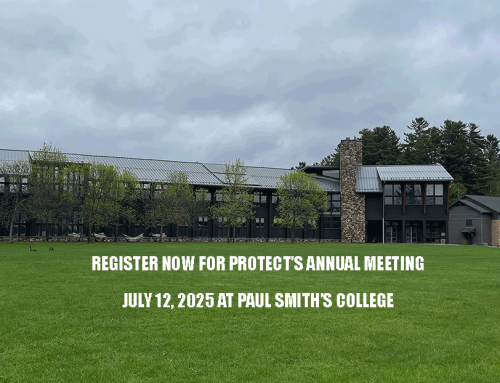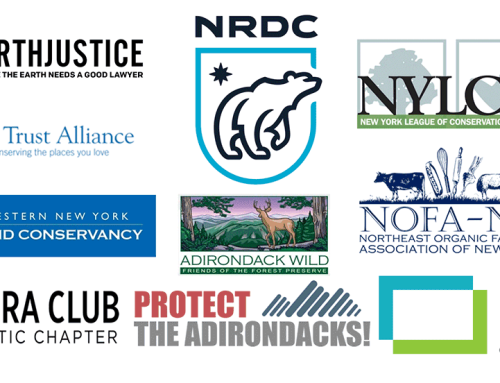Protect the Adirondacks and the Sierra Club put out a press release today about a new decision from the state Appellate Division to remand our discovery motion to State Supreme Court. You can read the entire press release here and the Court’s order here. Additional relevant legal papers are provided at the end of this post.
PRESS RELEASE
December 3, 2012
PROTECT and Sierra Club to Re-File Discovery Motion with Trial Court (as directed by the Appellate Division)
Discovery motion seeks information on violations of state ex parte contact rules that prohibit both “direct” and “indirect” communications during all phases of official, adjudicatory public hearings
PROTECT also filed a new lawsuit in November to challenge partial denial of Freedom of Information Law request by the APA
Protect the Adirondacks and the Sierra Club Atlantic Chapter will re-file a discovery motion as part of their lawsuit against the Adirondack Park Agency (APA) and Department of Environmental Conservation (DEC) challenging the approval of the 6,000-acre Adirondack Club & Resort (ACR) project in Tupper Lake. The new discovery motion will be filed in State Supreme Court in Albany County this week after a decision received (see attached) late last week in which the New York State Supreme Court, Appellate Division in Albany remitted the case to the lower court, and denied the discovery motion without prejudice, to re-filing it in the lower court.
PROTECT and the Sierra Club seek leave from the courts to conduct discovery in order to gather additional information regarding the groups’ “ex parte communications” allegations in their lawsuit filed against the Adirondack Park Agency (APA). The groups filed the lawsuit in March 2012, which included 29 different causes of action, including one about “ex parte” communications. State law prohibits both “direct” and “indirect” communications between senior APA staff and APA Commissioners with outside parties during all phases of an official adjudicatory public hearing such as the one conducted for the ACR project.
“Information obtained through a Freedom of Information Law (FOIL) request revealed extensive communications between the project sponsor and the APA leadership. PROTECT and the Sierra Club are seeking access to a variety of information that is being withheld, as well as the opportunity to depose key witnesses” said Peter Bauer, PROTECT Executive Director. All other work on this lawsuit has been suspended until the discovery motion is resolved.
“The Court’s decision was a procedural one. The discovery motion by PROTECT and the Sierra Club will now be handled by a lower court. We will now re-file the motion in Albany County. We expect that the state’s and ACR project’s attorneys will similarly oppose it, as they did in the Appellate Division” said John Caffry, of the Caffry & Flower law firm of Glens Falls, the lead attorney for the petitioners in the case.
4-Month Delay Caused by the Project Sponsor
PROTECT and the Sierra Club originally intended to make the discovery motion in the lower court in August. However, at the insistence of ACR’s attorney, PROTECT’s attorney agreed to wait to make the motion until after the case was transferred to the Appellate Division. It now appears that the Appellate Division did not agree with the procedure demanded by ACR’s attorney. The court’s remittal of the case means that the motion will now be made, some four months later, in the court where PROTECT and the Sierra Club expected to make it in the first place.
Discovery Motion Seeks Information About Ex Parte Communications Between Applicant and APA Leadership During Final Decision
Last spring, PROTECT and the Sierra Club submitted a FOIL request to the APA, seeking to review various materials pertinent to the APA’s decision to approve the 6,000-acre Adirondack Club & Resort. The FOIL response provided what appears to be evidence of substantial communications between senior APA staff and Commissioners with the project sponsor and with other state officials outside the APA. However, the APA denied release of what appears to be significant email and written correspondence between APA officials and other state officials, citing “attorney-client privilege,” among other alleged reasons for withholding the information. The discovery motion, if successful, will allow PROTECT and the Sierra Club to gain access to the withheld documents, as well as depose witness from among those involved.
“It’s important to hold regulatory agencies accountable for their actions. We believe that there were a series of irregularities during the APA’s approval of this controversial project. The ability to conduct discovery to gain access to withheld documents and to depose key participants would be of great benefit in the lawsuit” said Roger Downs, Sierra Club Atlantic Chapter Conservation Director. “We look forward to being able to gather information during this phase to make an even stronger case about what we believe were a series of illegal communications.”
New Lawsuit Filed Against APA to Challenge Denial of Freedom of Information Law Request
Protect the Adirondacks also filed a new lawsuit on November 21, 2012 to challenge the Adirondack Park Agency’s decision to withhold information. The group filed an Article 78 lawsuit that seeks access to various documents under FOIL that are pertinent to its current lawsuit filed in March 2012 that challenges the January 2012 approval by the APA of the 6,000-acre Adirondack Club & Resort project, the largest development approved in the history of the APA. The new lawsuit was filed in Warren County.
In July, the groups filed a Freedom of Information request with the Adirondack Park Agency for certain communications and materials related to the APA’s decision to approve the 6,000-acre Adirondack Club & Resort project around the Big Tupper Ski Area in Tupper Lake. The APA initially released some information that appeared to show extensive communications between senior APA officials, the project sponsor and other state officials. The groups believe these communications violate state laws that forbid all “direct” and “indirect” ex parte communications during adjudicatory hearings. In August, PROTECT and the Sierra Club appealed this decision within APA. At that time the APA released heavily redacted information and identified, but refused to release, over a dozen email and memo threads between APA officials and state officials outside the APA. APA cited “attorney-client privilege” and “attorney work product” privilege as the reasons for withholding this information. PROTECT is seeking the opportunity to review these communications.
John Caffry, the attorney for PROTECT in the new case, said “Due to the delay in the discovery process in the first case, which was caused by the opposition of ACR and the State to allowing us to conduct discovery, we had to file the second case, as an alternate means of obtaining these important documents that will shed light on the inner workings of the APA on the ACR project, and potentially also show how outside parties improperly influenced that process.”
All relevant materials have been posted on the PROTECT website.
More information about PROTECT’s initiatives and programs is available on the organization’s website. For more information about the Sierra Club Atlantic Chapter see the organization’s website.
Reference:
1. Appellate Division Order Remanding Discovery Motion to State Supreme Court
2. APA denial of PROTECT-Sierra Club FOIL Request
3. PROTECT-Sierra Club Motion to the Court
4. Lawsuit Challenging APA Denial of FOIL
5. ACR Attorney Memo





